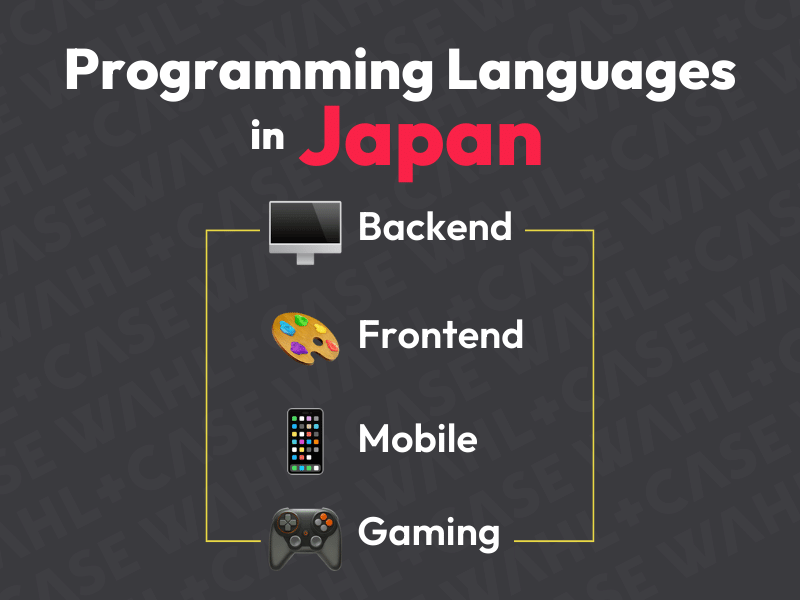What is a Front-end Engineer?
Nowadays it’s hard to find a company that doesn’t have its own website or web application. And who makes sure users have a nice experience visiting these pages and applications?
You guessed it. Front-end engineers!
They are the ones creating the experiences that all of us interact with on a daily basis. Everything you see when visiting a website or using a web application has been built by a front-end engineer.
In this article I will break down what a front-end engineer is, their responsibilities, requirements and career opportunities.
At Wahl+Case we have helped hundreds of front-end engineers find jobs in some of the hottest companies in Japan’s tech industry like PayPay, Line or SmartNews.
Interested in what jobs are currently available for front-end engineers in Japan? We have a designated team specialized in front-end engineering positions. Get in touch!
And now, without further ado, here is everything you need to know about front-end engineers and what they do.
What is a Front-end Engineer?
A front-end engineer is someone who builds the part of a website or web application that users can see and interact with. They focus on the front-end which encompasses all visitor facing aspects. Front-end engineering is also called client-side development because it involves programs that run on a client’s or user’s device like a web browser.
On the other side there is back-end engineering, also known as server side development because it involves programs that run on a server. These are the servers the web browser from the front-end interacts with to retrieve information. Both sides are important for making websites run properly. Developers who can work both the client side and the server side are called full-stack developers.
Depending on the company, front-end engineers are also often called front-end developers. Strictly speaking a software developer has more knowledge than an engineer because they can build from scratch and do end-to-end maintenance but these days engineer and developer are often used interchangeably.
What are a Front-end Engineer’s Responsibilities?
As a front-end engineer you will be responsible for bringing a design to live. You will be building websites, web-based features and web application services. You will be in charge of all interactions between a user and your product, e.g. clicking a button or filling in a form.
As a front-end engineer you will be closely working with product managers and designers. The product manager comes up with what is needed to drive the business forward by speaking to several stakeholders both internally and externally. They set the requirements and decide on what features will be built. Then the designer comes into play and creates the design, so what the new feature will actually look like. Designers don’t just make pretty designs but they also have to take into account that everything they design is user friendly and offers a good user experience.
And now it’s your turn. Once the design is ready, you can start implementing. Coding and building things will be the biggest part of what you do on a daily basis. This also includes testing and making sure everything works properly as well.
Coding will be your main job but you will also spend time collaborating with product managers and designers to make sure everyone is on the same page. Also in most companies you will start your day with a daily stand up meeting with your team to talk about what you did yesterday, what you’re planning to do today and what is blocking you from achieving your goals. This is a good way to keep everyone accountable.
What Opportunities does a Front-end Engineer have?
As with most technical positions the labor market is expanding (and I’m writing this the day Meta laid off 11,000 employees) and there are plenty of opportunities for front-end engineers. So it is a good entry level position to start your career in tech.
So what does the career progression of a front-end engineer look like?
As a junior front-end engineer you usually start by fixing bugs, building small features, testing code and making sure everything is functional. With time and experience you will gradually be working on more complex interfaces and features.
Once you have a few years of experience you can move to a senior front-end engineer role where you will be overseeing junior engineers as well as working more closely with back-end engineers.
From here you basically have three broader options.
First, you can remain an individual contributor and become a principal engineer. This is for people who want to keep coding on the front-end and don’t want to move into a people management role.
Second, you can move into a people management role like team leader or tech lead. This will set the foundation for a career in engineering management all the way up to a CTO role. Keep in mind that the higher you want to move in management the more you need a broader understanding of not just the front-end but the overall tech as well as excellent communication and leadership skills since you will be leading a larger team while also talking to a wider variety of stakeholders both on the technical as well as the business side.
The third option would be more of a horizontal move. Depending on your interests you can work on the back-end as well to become a full-stack engineer. A lot of people choose this option because back-end engineers tend to get paid more than front-end engineers. This would also be a good stepping stone to move into more of a management role since you have a broader understanding and more knowledge of both the front-end and the back-end.
If you want to move away from hand-on coding you can also move into a product manager role or if you prefer working on design you can move towards a UI/UX designer role.
As you can see, a front-end engineer is a good starting point for your career in tech and provides a wide range of opportunities.
But what skills do you need to become a front-end engineer?
What are the Requirements to be a Front-end Engineer?
Hard Skills
At the core every webpage is built with three coding languages: HTML, CSS and Javascript. HTML structures a page and builds all the blocks like images or text. CSS is used to make those blocks pretty, e.g. adding a shadow to the image or making the text bold. Finally, JavaScript is needed to add functionality to the web page. Here you define what happens when a user clicks on a button or hovers over an icon. These three languages are the foundation of front-end development. You have to understand the ins and outs of these languages
When you’re building a website a lot of the tasks are repetitive and it is not very resourceful to code everything from scratch. That’s why you will use frameworks and libraries to make the coding easier like React, Angular or Vue. Frameworks give you a foundation to start from so you don’t have to write every low level line of code yourself. This code has been worked on by different programmers, tested and optimized over time so it is more efficient to use it than writing your own code. Using frameworks will save you a lot of time, time you will need to focus on the high level functionality of your software instead of low level foundations. You don’t have to know all of the libraries to get started but should be familiar with at least one.
Tracking changes to the code is another crucial task because sometimes you or someone else from your team has to revert to an older version of the code. To do this you need a version control system like Git. It allows you to collaborate with your team and compare changes over time, reset to a previous version if you make a mistake and generally track all changes to your files.
These three skills (coding languages, frameworks/libraries, version control systems) are a must-have to become a front-end engineer and will be required in every job.
The next 2 skills will be helpful to increase your value in the job market.
First you should get familiar with CSS preprocessors like Sass, Less or Stylus. A CSS preprocessor is a program or a tool that lets you generate CSS code from newer and better languages. This is necessary to make sure the browser can properly read the style sheets. These are all fairly similar, so if you understand the purpose of a CSS preprocessor and know how to use it you can use them all.
Second we have a similar problem with JavaScript as well since it’s a fairly old programming language. That’s why many developers use a more modern form like TypeScript or CoffeeScript to write their code. Then they use a transpiler to translate and compile old JavaScript code that all browsers can understand. So I recommend getting familiar with these languages.
Skills Overview
Languages: HTML, CSS, JavaScript, TypesScript, CoffeeScript
Frameworks: Angular, Vue
Library: React,
Version Control Systems: Git,
CSS Preprocessors: SASS, LESS, Stylus
Soft Skills
As an engineer by far the most important skills are your hard skills as outlined above.
However, regardless of whether you are working for a company or freelancing, having some key soft skills will be beneficial in getting a job as well as performing well at work.
Communication skills
As an engineer you can’t spend 100% of your time coding. You will have to talk to your team members, designers, product managers, team leaders, clients etc So being able to communicate effectively will make your job easier. This will become more important if you are planning to go into a team leader or management role.
Being a team player
In 99% of jobs as a front-end engineer you will be working with a team. In larger companies you will be working with other engineers as well as designers and product managers, and in small startups you will be working closely with the founders and basically everybody who is there. So being able to work with other people is key to being a successful engineer. It will also make your work more enjoyable.
And that’s it.
I hope you know a little bit more about what a front-end engineer does, what skills are required and their opportunities.
If it sounds like a job for you, get in touch with us and we will help you find a suitable position.


























